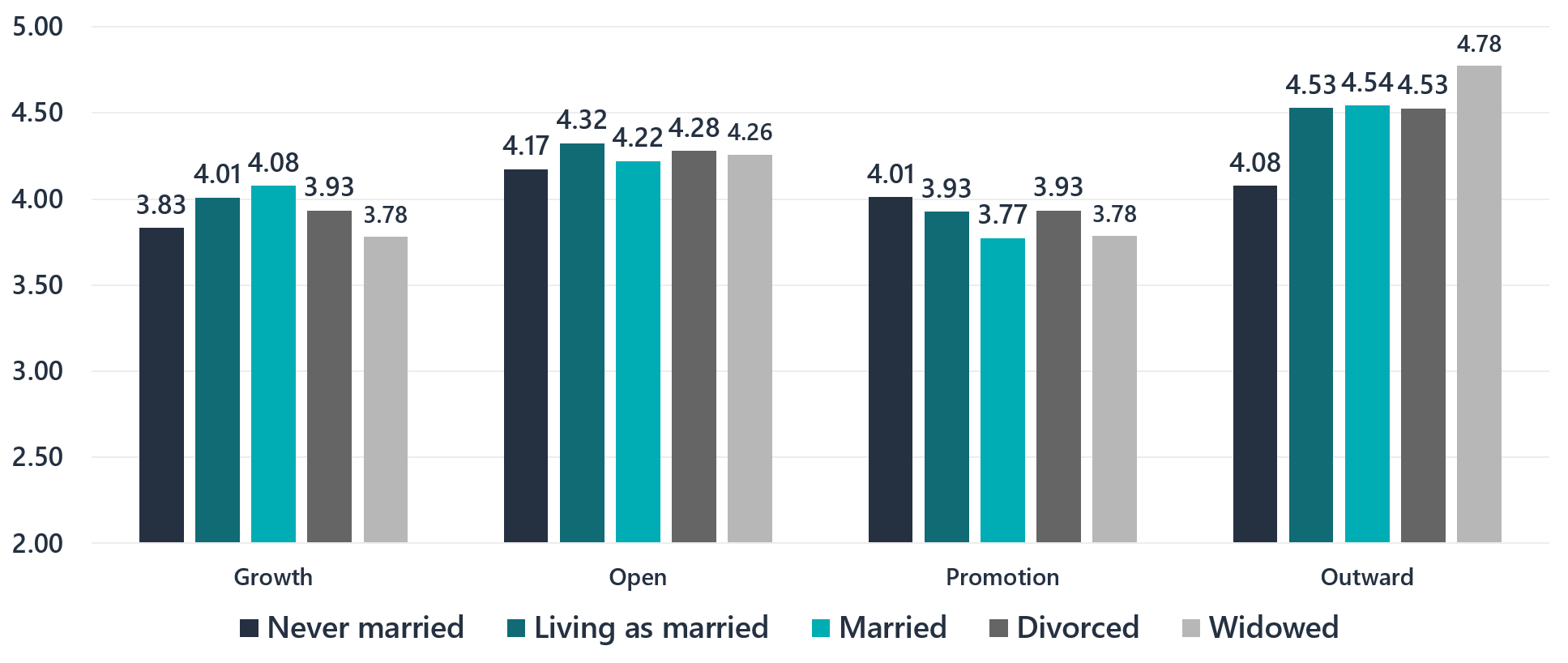I recently partnered with Aimpoint Research to investigate how mindsets might differ across different demographic profiles, including political affiliation, income level, gender, education level, generation, geographic region (in the United States).
I am finding the results quite interesting. I am in the middle of several articles, I will be sharing related to this research. Here are the other articles that I have compiled so far:
- Mindsets and Political Affiliation
- Mindset Differences across U.S. Geographic Regions
- Mindset Differences across Generations
- Mindset Differences across Ethnicities
This week, I’m covering how mindsets differ by marital status in the United States. I didn’t necessarily anticipate finding interesting differences here, but I don’t think I could have been more wrong. There are some interesting differences across those who have never married, are living with someone, are married, are divorced, and are widowed.
Research Information
Our sample was designed to be a decently close representation of the United States population at large. We ended with a sample of 587.
What I am presenting to you is the average mindset scores across different marital statuses. I was able to find unique differences across these marital statuses. To me, these differences are interesting, somewhat meaningful, but they ARE NOT technically statistically significant.
What this means is that we can infer that while one group (e.g., married) may have a more positive mindset than another group (e.g., widowed), we will surely find some people who are widowed that have more positive mindsets than other people who are married.
Regardless, it is interesting to see the differences.
Mindset Differences by Marital Status
Here are the results:

Big Picture Findings:
- Widowed. It appears that losing a spouse is traumatic. It causes someone to focus more on avoiding failure and problems, likely as a form of self-protection. But, it seems to make them significantly more empathetic compared to others who have not lost a spouse.
- Never Married. Overall, those who have never married have the most negative and self-focused mindsets. The exception to this is that they are the most promotion-minded. This is possibly because they have fewer familial responsibilities, which helps them to be more goal-oriented and more willing to take risks than others who may have more familial responsibilities.
- Married. It appears that being married has some pros and cons when it comes to mindsets. A pro is that they seem to be the most growth-minded. Perhaps this is because they have the love and backing of family members that they can focus more on learning and growing and less on protecting their image. A con is that they seem to be the most prevention-minded. They are the least goal-oriented and the least willing to take risks, possibly because they have the most familial responsibilities. They are middle-of-the-road for open and outward mindsets.
Key Mindset Findings:
- Fixed to Growth Mindsets. Those who are married have the strongest growth mindsets. This means that they are more focused on learning and growing than on looking good and avoiding failure. Those who are widowed and never married are the least growth-minded. This means that they are more focused on looking good and avoiding failure than those with a different marital status.
- Closed to Open Mindsets. For the most part, there aren’t large differences in the open-mindedness of people across different marital statuses. But, the most open-minded group are those living as married, while the least open-minded group are those who have never married.
- Prevention to Promotion Mindsets. Those who have never married are the most promotion-minded. This means that they are the most focused on achievement and reaching goals. The groups who are the most prevention-minded are those who are married and widowed. This means that they are the most focused on avoiding problems and limiting risk.
- Inward to Outward Mindsets. Those who are widowed are far and away the most outward-minded. This means that they are much more inclined to see and value others as people. Those who have never married are far and away the most inward-minded. This means that they are much more inclined to see others as objects, and value them as such.
While these are very interesting findings, they are also generalities. These results DO NOT suggest, for example, that all married people are growth-minded and that all widowers are prevention-minded.
If you want to take the mindset assessment for yourself, you can take it here: FREE Personal Mindset Assessment










